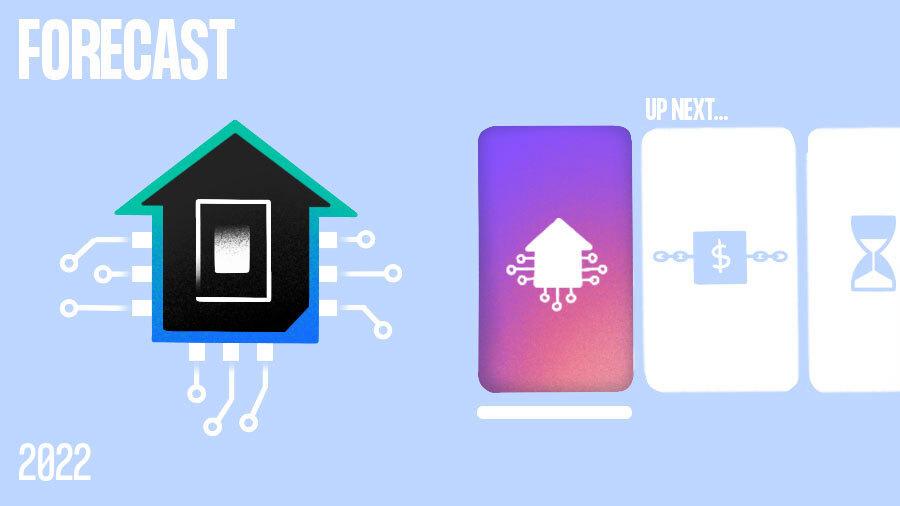52Shares
With milestones like Procore’s IPO and despite low points like the collapse of construction unicorn Katerra, proptech had a banner year in 2021. All told, venture-backed companies in the real estate and property tech space raised nearly $21 billion, Crunchbase data shows.
Going into 2022, there will likely be more investment in real estate software surrounding the construction and property management spaces—two sectors that were standout areas for investment within proptech in 2021, according to Crunchbase data. There’s also expected to be more consolidation in the industry as companies mature and look for exits, according to experts in the area.
There are multiple factors that make the macroeconomic environment ripe for proptech investing, including the shift in institutional investors buying single-family homes, according to Lauren Weston, an associate at Thomvest Ventures, who’s focused on early-stage investments in the fintech and real estate sectors.
Search less. Close more.
Grow your revenue with all-in-one prospecting solutions powered by the leader in private-company data.
Start Your SearchRenting in general is becoming more common, but more people renting homes from institutions like Blackstone paves the way for investment in different types of technology.
Real estate is an asset class that investors can get yield on, especially with interest rates so low.
“Institutions are interested in real estate, and that means that technology will have to follow,” Weston said.
Construction tech
Within construction tech, embedded finance, project management software and home improvement tech will all continue to be popular areas for investment next year, according to Weston. Venture-backed construction tech startups raised more than $3.8 billion in funding in 2021, per Crunchbase data.

Embedded finance—or the technology that enables payments online—is already a big theme in fintech and is already being adopted in the proptech sector, according to Weston. But it will likely become more prominent next year in construction tech, especially with embedded lending. One example is Lendflow, a startup that aims to make it simpler for software companies to embed lending services into their products.
Project management software that replaces spreadsheets and emails, like Bridgit, will also likely be popular among investors as the construction industry looks to digitize pre-construction, workflows and financial management. Homeowners’ attention turned to home improvement amid the COVID-19 pandemic, and with a supply shortage for housing, another way to create more housing could be renovating outdated and rundown properties.
“I think proptech is big and broad and, particularly within residential proptech where I focus, there are so many tailwinds in the space,” Weston said.
In construction tech generally, there’s a new wave of companies cropping up that want to combine design, offsite construction and new materials, and those sorts of companies will likely be “key areas for investment” as well, according to Raj Singh, managing partner of JLL Spark, the proptech-focused venture fund of the commercial real estate company JLL.
Property management tech
Gen Z is also getting older and becoming renters, a factor in an emerging theme that affects all areas of proptech, according to Fatima Dicko, founder and CEO of Sugar, a proptech startup that connects members of residential communities.
“You’re seeing more Gen Z folks renting and they’re way more tech savvy, they’re interested in smart home technology, they want to control everything from their phone,” Dicko said.
There’s an increased demand for digital solutions to pay rent and unlock doors, along with touring properties and signing rent agreements virtually, she said.
“We’re seeing a lot of stuff around digital tours, being able to virtually tour an apartment from online, being able to get a digital key and do a self-guided tour,” Dicko said.
The COVID-19 pandemic accelerated the normalization of virtual tours and signings, and now there’s more of an opportunity to invest in technology that appeals to the Gen Z renter.
Proptech maturation
Procore’s IPO earlier this year was a significant milestone for the proptech industry. It was a major exit for a VC-backed construction tech company and a validation of investment into the space. Procore’s IPO signaled a large total addressable market for the construction industry, and a maturation for the proptech sector, according to Weston.
“We’re seeing the maturation of proptech, which is really encouraging, and you also have larger companies in the ecosystem who can be potential buyers of companies, which is huge,” Weston said.
A 2021 report by JLL suggested the space was maturing, which has implications for consolidation in the space, according to Singh.
“While this will be gradual, we expect to see additional mergers, acquisitions and IPOs in the year ahead, especially M&A as industry consolidation starts, in order to provide the scale and scope required to serve the largest of commercial customers,” Singh said in an email.
According to Crunchbase data, 125 venture-backed companies in the real estate industry group were acquired in 2021, the highest amount in the past five years. That consolidation is expected to continue, especially as legacy players look to add proptech software companies to their portfolio.
“There’s probably going to be more consolidation between these traditional hardware companies and these residential engagement or software companies,” Dicko said.
Illustration: Dom Guzman
Learn MoreStay up to date with recent funding rounds, acquisitions, and more with the Crunchbase Daily.









